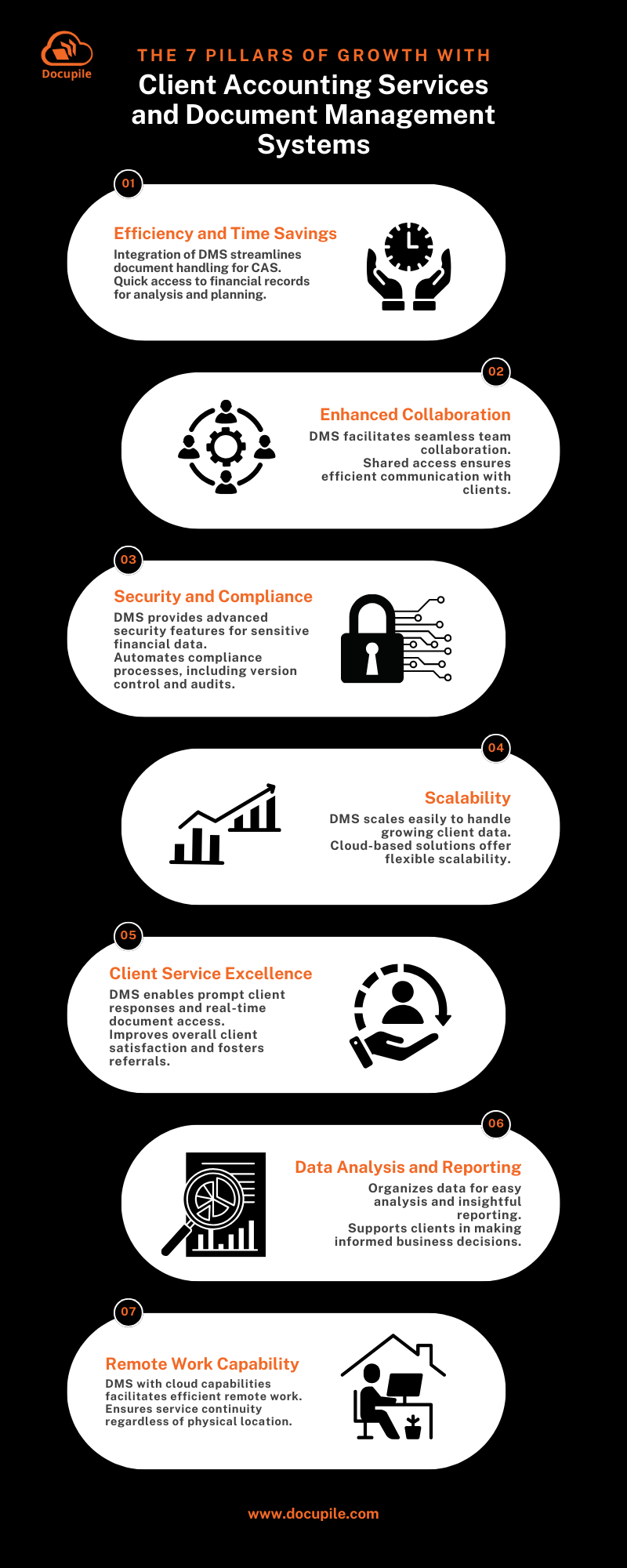An Introduction to Client Accounting Services (CAS)
In the dynamic landscape of modern business, managing financial intricacies is crucial for sustainable growth. Client Accounting Services (CAS) have emerged as a strategic solution, allowing businesses to delegate financial responsibilities to professional firms. In this blog post, we explore the fundamentals of CAS, its diverse formats, client onboarding checklist and the pivotal role it plays in shaping a business’s financial & accounting efficiency.
Want to Learn More?
Check Out: How Electronic DMS for Accounting Firms Helps Accounting Team
At a Glance
Accelerating Accounting -Infographic!
What are Client Accounting Services (CAS)?

Client Accounting Services, abbreviated as CAS, encompass a range of financial tasks that businesses can outsource to professional accounting firms. From bookkeeping and payroll processing to financial reporting, CAS enables businesses to focus on their core competencies while ensuring accurate and efficient financial management.
The Significance of How CAS is Tailored for Your Business
The packaging of Client Accounting Services (CAS) by a firm is more than a mere logistical consideration; it plays a pivotal role in shaping the dynamics of the client-firm relationship and, consequently, the success of the business. The way CAS is packaged influences the level of customization, flexibility, and alignment with the unique needs of a business.
Selecting the Ideal CAS Format to Match Your Business Needs

CAS is not one-size-fits-all; it comes in various formats. From comprehensive full-service packages to more specialized options, businesses must choose the format that best suits their specific requirements. This section guides readers through the considerations for selecting the most appropriate CAS format for their unique financial needs.
Offshore and Onshore CAS:
The choice between offshore and onshore Client Accounting Services introduces businesses to a global dimension in financial management. Each option has its own set of advantages and considerations that can impact a business’s operations and bottom line.
Cost Considerations: Offshore CAS often provides cost savings due to lower labor costs in certain regions. On the other hand, onshore CAS might come with a higher price tag but can offer benefits such as closer proximity, cultural alignment, and potentially faster response times.
Time Zone Differences: Offshore CAS may lead to time zone challenges, impacting communication and real time collaboration. Onshore CAS, being within the same or similar time zones, can facilitate more immediate responses and seamless communication between the client and the accounting firm.
Regulatory Compliance: Onshore CAS typically aligns more closely with local regulatory requirements, potentially reducing compliance risks. Offshore CAS providers need to navigate different regulatory landscapes, requiring a thorough understanding and adherence to various international regulations.
Centralized and Decentralized CAS:
The decision between centralized and decentralized CAS models revolves around how the accounting services are organized and delivered. Each model has its own set of advantages and considerations that businesses should weigh based on their structure and preferences.
Consistency vs. Customization: A centralized CAS model ensures consistency in service delivery across different business units. In contrast, a decentralized model allows for more customization to cater to the unique needs of individual departments or subsidiaries. The choice depends on the level of standardization desired by the business.
Communication and Coordination: Centralized models often streamline communication and coordination since services are managed from a single point. Decentralized models, while offering more localized control, may require effective communication channels to ensure cohesive financial management strategies across the organization.
Scalability: The scalability of CAS services is a crucial factor. Centralized models may provide easier scalability since resources can be allocated centrally. Decentralized models, however, may offer more agility in adapting to specific business unit requirements but may face challenges in maintaining consistency at scale.
Unlocking the Advantages of CAS for Business Efficiency

Outsourcing financial tasks through Client Accounting Services brings forth numerous benefits, reinforcing the idea that businesses do not have to handle every aspect of their finances internally.
In essence, the benefits of using CAS underscore the idea that businesses can enhance their financial operations by tapping into external expertise and resources. This strategic decision allows businesses to streamline operations, reduce costs, and gain the agility needed to thrive in a competitive business landscape.
Making informed decisions based on actionable insights:

CAS is not just about managing numbers; it’s about deriving actionable insights from financial data. This section explores how businesses can leverage CAS for informed decision making, turning financial information into strategic advantages for long-term growth and success.
10 Essential Components of a Successful Onboarding Checklist for Accounting Clients
An efficient onboarding checklist is crucial for a successful client firm relationship in the accounting landscape. This checklist outlines ten essential elements, including signed contracts, onboarding emails, access to previous accounting systems that the client used, and more. Ensuring these components are in place facilitates a seamless transition for both the client and the accounting firm.
21 Questions to Ask Accounting & Bookkeeping Clients:

During the onboarding process, Asking the right questions during the onboarding process is fundamental. This set of questions delves into various aspects of a client’s business for your accounting client onboarding checklist, that lays the groundwork for effective financial management. From business operations to regulatory challenges, each question is crafted to establish a comprehensive understanding.
10 Questions to Guide the Initial Phase of Your Client Engagement
- 1
What can you tell us about your business?
Understanding the client’s overall business provides a foundational insight into its operations, goals, and challenges, forming the basis for tailored accounting strategies.
- 2
What kind of business are you in?
Clarifying the nature of the business helps in customizing accounting approaches, ensuring industry-specific regulations and nuances are considered.
- 3
Do you maintain payroll accounts?
Diving into payroll details reveals the complexity of employee compensation, tax withholdings, and compliance, vital for precise financial management.
- 4
Do you have inventory?
For businesses dealing with inventory, exploring inventory management practices is essential for accurate financial reporting and optimizing stock levels.
- 5
How many accounts do you have?
Understanding the number of accounts provides insights into the complexity of financial transactions and the level of bookkeeping required.
- 6
Are your tax returns current?
Ensuring up-to-date tax returns is crucial for compliance, preventing potential issues with tax authorities and ensuring financial accuracy.
- 7
Do you report sales tax?
Verifying sales tax reporting practices ensures compliance with tax regulations and avoids potential legal and financial repercussions.
- 8
What are your plans for expansion or contraction of the business?
Understanding the client’s growth or contraction plans enables the accounting firm to adapt financial strategies accordingly.
- 9
How do you define success?
Gaining insight into the client’s definition of success helps tailor financial strategies to align with their overarching business objectives.
- 10
What’s one thing about your business you’re most proud of?
Identifying a point of pride offers insight into the client’s values and achievements, contributing to a holistic understanding of their business.
11 Inquiries to Further Deepen Your Understanding
- 1
If you could solve one challenge, what would it be?
Identifying a key challenge allows the accounting firm to address specific pain points, contributing to overall business improvement.
- 2
How is your workforce performing?
Understanding workforce performance aids in assessing labor costs, productivity, and potential areas for improvement or optimization.
- 3
Are you having any regulatory challenges?
Identifying regulatory challenges helps the accounting firm address compliance issues, minimizing legal risks and ensuring financial adherence to regulations.
- 4
What is your debt-to-equity situation?
Examining the debt-to-equity ratio provides insights into the client’s financial leverage and risk, influencing strategic financial decisions.
- 5
What is your portfolio’s performance recently compared to the market?
Analyzing portfolio performance offers a glimpse into investment strategies, risk tolerance, and potential areas for optimization.
- 6
Are you up to date on changes in local tax laws?
Ensuring awareness of local tax law changes is vital for compliance, avoiding penalties and optimizing tax strategies.
- 7
How do you think we can add value to your company?
Understanding the client’s expectations allows the accounting firm to tailor services to provide maximum value, contributing to the client’s success.
- 8
Are you interested in cross-referral opportunities?
Exploring cross-referral opportunities fosters a collaborative relationship, potentially benefiting both the client and the accounting firm.
- 9
Why are you changing firms?
Understanding the reason for changing firms provides insights into the client’s expectations and areas where the previous firm may have fallen short.
- 10
Can you name a few strengths your previous firm had?
Identifying strengths from the previous firm helps in aligning services to meet or exceed client expectations.
- 11
How could your former firm have improved its service?
Learning about areas for improvement from the client’s perspective guides the accounting firm in delivering more tailored and effective services.
Wrapping Up the Journey with Client Accounting Services
In conclusion, Client Accounting Services serve as a strategic ally in navigating the complex terrain of financial management. From selecting the right CAS package to embracing outsourcing benefits and leveraging actionable insights, businesses can optimize their financial processes. A thorough onboarding process, coupled with insightful questions, establishes a strong foundation for a successful partnership between clients and accounting firms. Also, the accounting client onboarding checklist, when used to comprehend different facets of a client’s business, establishes the foundation for efficient financial management. By embracing CAS, businesses can focus on their core strengths, fostering sustained growth and innovation in the ever-evolving business landscape.
Learn More – A Tool to Help Revolutionize Document Management for Accounting Firms





